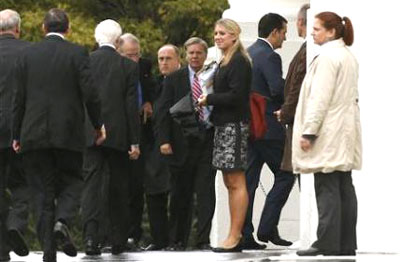
Obama, Republicans inch towards key deal
New York, October 12, 2013
US President Barack Obama and congressional Republican leaders inched toward resolving their fiscal impasse on Friday, but struggled to agree on the length and terms of a short-term deal to increase the US debt limit and reopen the government.
Obama met Senate Republicans at the White House and spoke by phone to House of Representatives Speaker John Boehner as negotiations intensified on how to get hundreds of thousands of federal workers back on the job and extend the government's borrowing authority past the October 17 limit.
It was hard to gauge the progress of talks, as all sides refused to divulge many of the specific details of what is being discussed.
But both sides spoke with new optimism about the possibility of avoiding a fiscal crisis. Lawmakers were expected to work through the weekend with a goal of finishing a deal by early next week.
Economists have warned that a debt default would create global economic chaos, and analysts warned on Friday that if the shutdown lasts more than a month it would cause a sharp slowdown in fourth-quarter economic growth.
Obama wants the debt ceiling raised for longer than the six weeks first proposed by Republicans, and Republicans want a commitment to broader deficit-reduction talks from the White House.
"The two of them agreed that all sides need to keep talking," White House spokesman Jay Carney told reporters after the call between Boehner and Obama. "It at least looks like there is a possibility of making some progress here."
House Republicans will meet at the Capitol on Saturday morning to discuss their options after sending the White House a proposal that included the short-term increase in the debt limit that would clear the way for re-opening the government.
Meanwhile, finance officials from the world's biggest economies have pressed the US to head off a potentially devastating default.
A communiqué issued at the end of a meeting of Group of 20 finance ministers and central bankers said the United States "needs to take urgent action to address short-term fiscal uncertainties."
Officials from around the globe have warned that failing to raise the debt cap would wreak havoc on the global economy.
Anton Siluanov, finance minister of this year's G20 chair, Russia, said the mention in the group's communiqué amounts to a "general wish for a fast solution."
"Our American colleagues are doing everything possible in order to find a mutual understanding or agreement with the Congress," Siluanov told reporters.
Solving the impasse is crucial for a global economy that the G20, which accounts for 90 per cent of world output and two-thirds of its population, said is showing signs of improvement but still facing "downside risks."
Maintaining growth momentum is likely to get even more challenging as central banks begin winding down the monetary stimulus launched during the 2007-2009 global financial crisis.
The prospect of the US Federal Reserve reining in its stimulus by year end spooked world markets earlier this year and plunged some developing countries into turmoil as the gusher of cheap dollars that had poured into their economies dried up.
Echoing the statement from a summit of G20 leaders in St. Petersburg last month, the group of advanced and emerging nations pledged to ensure any monetary policy changes are "carefully calibrated and clearly communicated" and said navigating swings in capital flows would remain a challenge.
It said emerging economies remained important drivers of global growth, even though many have slowed sharply in recent years and are expected to brake further.
"A while ago there was an excess of exuberance and now perhaps an excess of pessimism," Brazil's central bank chief, Alexandre Tombini, said in a statement prepared for delivery to a meeting of finance officials on Saturday.
"Brazil and many emerging economies in general are in a much stronger position than usually portrayed to withstand the current transition turbulence," he said.
Whatever reduces uncertainty is positive but I think that really to reduce uncertainty in a substantial way we would need a long-term solution," said Ewald Nowotny, a member of the European Central Bank's Governing Council. "Still, it seems to be better than nothing."-Reuters







